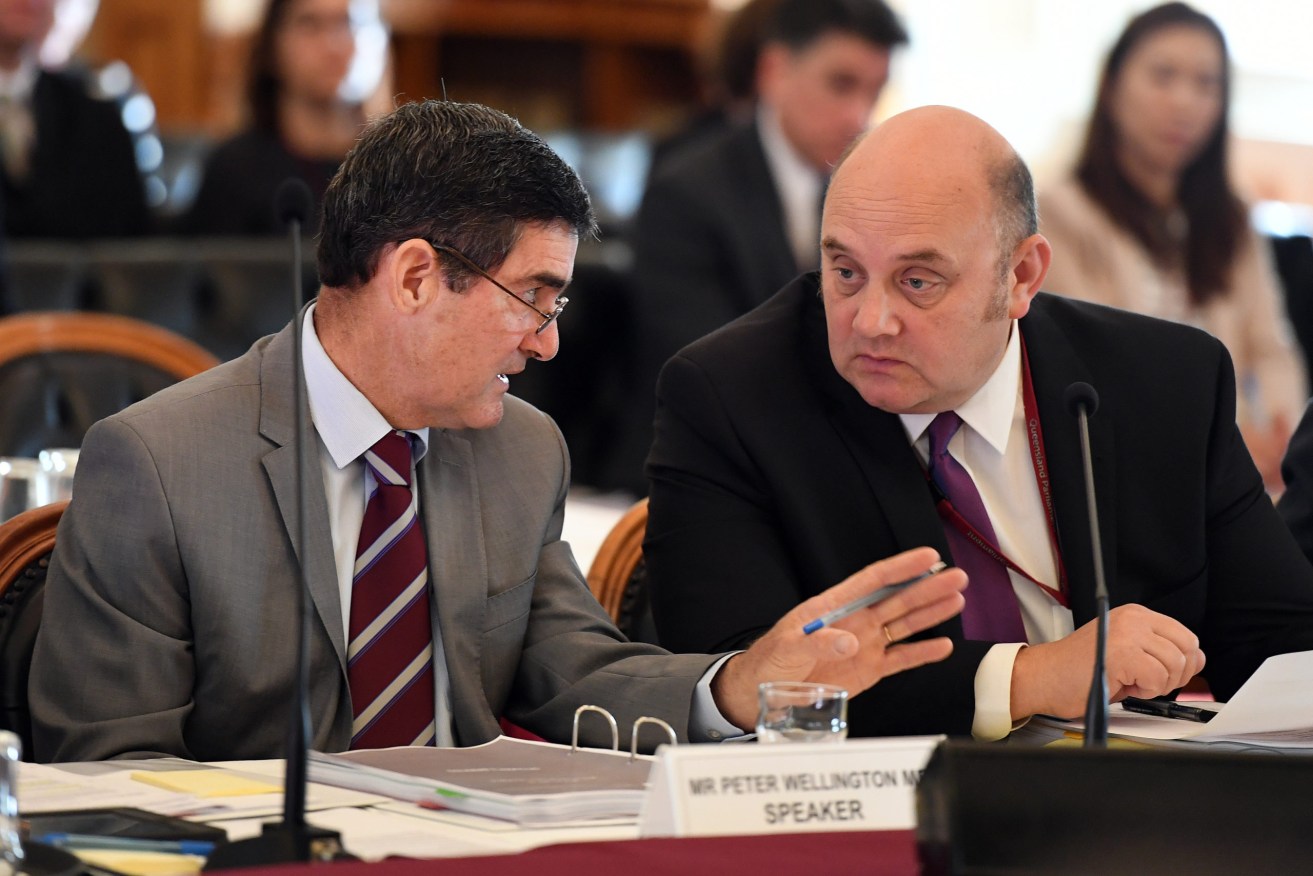Parliament’s top official warns corruption safeguards ‘fatally weakened’ in Qld
The Clerk of the Queensland Parliament, Neil Laurie, has delivered a sobering critique of governments, the media, stakeholder groups, parliament, and anti-corruption efforts.

The Clerk of Parliament, Neil Laurie, confers with then speaker Peter Wellington during a committee hearing in 2017. (AAP Image/Dan Peled)
Laurie, who has been clerk for over 18 years, does not often speak out on issues but when he does people listen. In recounting Queensland’s history of corruption, he has warned that “some of the wider safeguards that existed prior to and immediately after the Fitzgerald inquiry and report have now been fatally weakened”.
He made the comments to a parliamentary committee reviewing the Crime and Corruption Commission. To Laurie, the lack of other safeguards creates risks, bolsters the need for the CCC, and should compel the government and parliament to make the CCC even stronger.
“Take, for example, the decline of the media, the often titled “fourth estate”. It has long been maintained that investigative journalism may uncover examples of institutional corruption, abuse, or mismanagement. But commercial media revenues have been gutted by the rise of the internet and social media,” Laurie wrote in his submission.
“Media cut-backs have seen the decline of resources for investigatory journalism. Although there are some that argue that investigative reporting is adapting to the new digital media landscape, the best that can be said is that we are in a time of flux.”
Laurie said the ABC’s decision to scrap state-based editions of the 7.30 Report meant TV coverage of Queensland politics had “largely vanished”.
“Commercial news media spends only a fraction of their time reporting state-based political and accountability matters, with far more time spent on the goings on in football or other sport (particularly the private lives of their participants),” Laurie wrote.
“The time spent on state-based political and accountability matters by the commercial broadcasters is usually incomplete, sensational and inept. I do not necessarily blame the journalists for this, but rather the content and editorial decision makers.”
Laurie also declared “the migration of senior or experienced political journalists from both commercial and public media to government at all levels is a very concerning trend that remains under-reported, I suspect because of media solidarity”.
“But their migration bells the cat about the health of political journalism, the under-investment in serious journalism and the decline of the fourth estate as an accountability mechanism,” he wrote.
“It is apparent that there are more resources for spin than there is in serious journalism.”
Laurie said he feared Australia was “trending like that of the USA, where media is retreating from the balanced, sensible middle ground to locked-in partisan positions”.
Professional organisations and stakeholder groups “struggle to deal with the increasing multitude of issues” and could themselves become politically biased, while society was worse off due to the “decline of academic commentary on accountability, ethics and politics”.
On the parliament itself, Laurie said the revitalisation of committees had helped provide more accountability but there were still “weaknesses,” largely due to parliament being controlled by the government of the day.
“The ability of the Legislative Assembly or its committees to hold any government to account or act as an inquisitor is weakened by the arithmetic of the vote in the House and committee,” Laurie wrote.
“Committees are performing exceptionally well in the legislative space and being given an increasing role in policy development through law reform referrals, but how are they performing the role of keeping government to account for its actions? At the end of the day what a committee investigates and how it investigates will be subject to the will of the majority and sometimes the decisions themselves will not be revealed.”
Turning his attention to the CCC, Laurie questioned the broader policy of devolution, where some corruption or misconduct complaints are referred to the agency involved to investigate under CCC supervision.
“Over the past decade there have been investigations involving serious allegations of police misconduct referred back to the Queensland Police Service that would make people that recall the pre-Fitzgerald era scratch their heads,” he wrote.
Laurie suggested the corruption watchdog would benefit from broader expertise – “the bottom line is that the CCC is now dominated by lawyers, a situation that was not contemplated by the Fitzgerald vision” – and would benefit from greater transparency, partly to be kept accountable itself.
“Increasing calls by the CCC to restrict public commentary about CCC complaints should be ignored,” Laurie wrote, after the Palaszczuk Government and the CCC flirted with the idea before the last election.
“One result of any such legislative action would be to make the CCC less accountable for its actions, or lack of action. It would be a very dangerous road to traverse. I treat with ‘a grain of salt’, the refrain from the CCC that public airing of complaints hurts their investigations. It may place pressure on the CCC to act more hastily than it otherwise would, but I am yet to be convinced by any hard evidence that public airing of complaints has thwarted an investigation. If that is the CCC’s contention, then it needs to back that claim with multiple examples of cases jeopardised. I suspect that delay has caused more issues than public airing.”
Laurie also criticised the trend of the CCC releasing press releases, and holding press conferences, at the conclusion of an investigation, rather than issuing a final report.
The Parliamentary Crime and Corruption Committee is conducting a routine review of the CCC.












